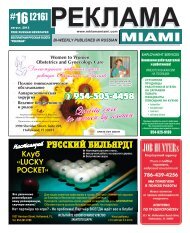Реклама Майами - Флориде
Реклама Майами - Флориде
Реклама Майами - Флориде
You also want an ePaper? Increase the reach of your titles
YUMPU automatically turns print PDFs into web optimized ePapers that Google loves.
News<br />
30 • REKLAMA MIAMI • NO. 18 (218) • СЕНТЯБРЬ • 2012 TEL: 954•344•7797<br />
FROM RUSSIA WITH NEWS<br />
Russia more highly educated<br />
than any OECD nation<br />
The Organization for Economic<br />
Cooperation and Development has<br />
released a report revealing that Russia<br />
has the highest number of highereducated<br />
people compared with any<br />
OECD nation. Fifty-four percent of<br />
Russians aged between 25 and 64<br />
had a higher education. The next<br />
highest figures were for Canada (51<br />
percent), Israel (46 percent) and the<br />
United States (42 percent). «Much of<br />
this [Russia’s] advantage is the result<br />
of the country’s historically strong<br />
investment in education, as there are<br />
high levels of education among older<br />
age groups.» read the report. It added<br />
that the number of foreign students<br />
studying in Russia had increased by<br />
78 percent from 2005 to 2010, placing<br />
it 7th in the world (and third among<br />
non-English speaking countries) in<br />
terms of the percentage of foreign students<br />
enrolled worldwide.<br />
The Moscow News<br />
Producers Fight Over<br />
Chocolate Trademark<br />
The young girl on the wrapping of the<br />
Alyonka chocolate bar may look timid and<br />
sweet, but to Russian confectioners she is<br />
more dangerous than her namesake, Helen<br />
of Troy. The fight for Alyonka between<br />
confectioners in the two Russian capitals<br />
started when the Federal Anti-Monopoly<br />
Service prohibited the St. Petersburgbased<br />
Krupskaya Factory from producing<br />
Krupskaya Alyonka chocolate. Moscow’s<br />
United Confectioners, which had patented<br />
the Soviet Alyonka brand in 1999, had<br />
complained that the products’ wrappers<br />
were too similar. But now Krupskaya is<br />
striking back by producing the Mechta<br />
Alyonki (Alyonka’s Dream) chocolate bar.<br />
The confectioner, which is owned by Orkla<br />
Brands Russia, has also filed a notice<br />
with the Federal Service for Intellectual<br />
Property to get rights to produce other<br />
sweets under the Mechta Alyonki brand,<br />
Marker.ru reported, citing Olga Agafonova,<br />
a spokeswoman for Orkla Brands. The battle<br />
for Soviet brands is gaining more momentum<br />
now, with companies also squaring off to<br />
get rights to old alcohol brands, as well as<br />
the famous Vologda butter. Russia’s entry<br />
into the World Trade Organization has<br />
given local companies new mechanisms<br />
for getting and protecting intellectual<br />
property rights, which is helping to fuel the<br />
fight. But some experts question the value<br />
of this struggle. Andrei Stas, founder of Stas<br />
Marketing, said that it is not beneficial for<br />
companies to have Soviet brands anymore<br />
because the younger generations are not<br />
loyal to them. “Their time has passed,” he<br />
said. “The generation that grew up on these<br />
brands is getting old, and the youth are not<br />
interested.” However, Stas expects that the<br />
battle for Soviet brands may still continue<br />
for years, in part because companies want<br />
to capitalize on the society-wide nostalgia<br />
for old times. Zhiguli beer and Yantar and<br />
Druzhba processed cheeses are some of<br />
the Soviet brands that are still thriving on<br />
this nostalgia. “As long as those who ate<br />
these products in Soviet times are alive, the<br />
battles will continue,” Stas said.<br />
The St. Petersburg Times<br />
U.S. visa price falls to $20<br />
Russia is hoping that the easing of the<br />
visa regime with the United States, after<br />
an agreement comes into force on Sept.<br />
9, will be the first step to abolishing visa<br />
requirements between the two countries,<br />
the Russian Foreign Ministry announced.<br />
The new agreement cancels obligatory<br />
invitations for visas, allows for multientry<br />
three-year visas for tourists and<br />
business-people, and reduces the price of<br />
business and tourist visas from $100 to<br />
$20. However, consul fees of $160 will still<br />
apply. Both sides agreed to limit processing<br />
times to 15 days. “We are hoping that this<br />
agreement, which is aimed at cardinally<br />
easing mutual conditions for trips, will<br />
not only help increase economic, cultural,<br />
scientific and humanitarian connections<br />
between the two countries, but will create<br />
advantageous conditions for further<br />
liberalizing the bilateral visa regime until it<br />
is fully abolished,” the ministry said.<br />
The Moscow News<br />
Moscow loses its shine<br />
for Russians<br />
Life in Russia’s two major cities, Moscow<br />
and St. Petersburg, is no longer lucrative<br />
for ambitious provincials, a recent poll<br />
has found. Career outlooks in other cities<br />
of over 1 million residents are becoming<br />
more promising, while living standards<br />
are also believed to be on the rise, staterun<br />
pollster VTsIOM said on its website on<br />
Tuesday, announcing the results of a survey<br />
of 1,600 people from 138 cities and towns in<br />
46 regions. The number of those who seek a<br />
career outside the capital has doubled over<br />
the past six years, and has reached now 18<br />
percent. Those who believe Moscow to be<br />
the place where higher standards of living<br />
are more accessible still number 47 percent,<br />
while in 2006 they amounted to as much as<br />
56 percent. The pet peeve for all Muscovites<br />
– real estate prices – has become the city’s<br />
weakest side in the eyes of Russians. Only 17<br />
percent see Moscow as a place where they<br />
can hope for better housing, in comparison<br />
with 25 percent in 2006. Today, finding a<br />
place to live in regional cities seems realistic<br />
for 44 percent, which is 11 percent higher<br />
than six years ago. Moscow is also becoming<br />
less attractive for those looking to start a<br />
business, find a job or become a top official.<br />
Окончание на с.33















